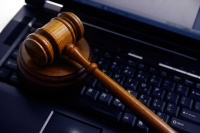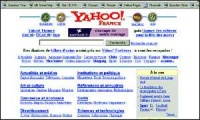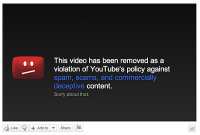Difference between revisions of "Cyberlaw"
(Edited Ethical Issues) |
(Reorganizing The Law of the Horse) |
||
| Line 15: | Line 15: | ||
'''Opposing Arguments''' | '''Opposing Arguments''' | ||
| − | Easterbrook’s theory was challenged by Lawrence Lessig, a professor at Harvard Law School, in an April 1997 article "The Law of the Horse: What Cyberlaw Might Teach." He argued that the law will face limitations in cyberspace due to the nature of the cyberspace or rather its lack of nature, " that its architecture of its design...is a code. THis code can change either because it evolves in a different way or because government or business pushes it to evolve in a particular way."<ref>https://cyber.harvard.edu/works/lessig/finalhls.pdf</ref> He identifies these constraints on regulations as 1 | + | Easterbrook’s theory was challenged by Lawrence Lessig, a professor at Harvard Law School, in an April 1997 article "The Law of the Horse: What Cyberlaw Might Teach." He argued that the law will face limitations in cyberspace due to the nature of the cyberspace or rather its lack of nature, " that its architecture of its design...is a code. THis code can change either because it evolves in a different way or because government or business pushes it to evolve in a particular way."<ref>https://cyber.harvard.edu/works/lessig/finalhls.pdf</ref> He identifies these constraints on regulations as (1) laws, which orders people to behave in certain ways promises to punish if these orders are not followed, (2) norms, which like laws they control people's behaviors, but their punishments are not centralized, and unlike laws are enforced by the community, not the government, or (3) markets, which regulate price. Lessig claims markets are able to constrain because of "other constraints of law and social norms; property and contract law govern markets; market operate within the domain permitted by social norms, but given these norms,and given this law, the market presents another set of constraints on individual and collective behavior." (4) Architecture, by which he means the physical world as we find it, even if "as we find it" is simply how it has already been made. |
==Ethical Issues== | ==Ethical Issues== | ||
Revision as of 21:39, 6 April 2017
Cyberlaw is a field in law dealing specifically with the landscape of various crimes now able to be committed due to the increased usage of the internet. Also known as Internet law, it encompasses legal issues related to Internet use. Some concerns involve privacy, freedom of speech, jurisdiction, and internet usage.
Contents
Why the need?
Cyberspace as a place to share information, buy and sell goods, connect with other people, download files and publish content. Cyberspace does not have a definite structure. Because of the its flexibility, there are some concern for rules to be placed so that illegal and ethically wrong activities in real life are not replicated in cyberspace. Regulations are based on the design of the infrastructure of society itself, and because "cyberspace has no nature; it has no particular architecture that cannot be changed". [1]
The Law of the Horse
The Law of the Horse is in reference to the an essay written by Frank Easterbrook regarding his objection to the introduction of cyberlaw as a new area of study [2]. The law of the horse refers to the idea that just because there are rules dealing with the sale of horses, horse licensing, breeding, racing etc. does not mean that there has to be an enture sub-sect of law that deals with horses. Easterbrook feel the same way about the internet and the ways in which it is used. He believes that cyberlaw does not need to be reclassified and given special treatment under law. Rather, everything that we do in an online environment has already been defined by the law, and that most online interactions can be defined under property. He makes the point that laws often make mistakes, and that we should "not struggle to match an imperfect legal system to an evolving world that we understand poorly ". [2]
Opposing Arguments
Easterbrook’s theory was challenged by Lawrence Lessig, a professor at Harvard Law School, in an April 1997 article "The Law of the Horse: What Cyberlaw Might Teach." He argued that the law will face limitations in cyberspace due to the nature of the cyberspace or rather its lack of nature, " that its architecture of its design...is a code. THis code can change either because it evolves in a different way or because government or business pushes it to evolve in a particular way."[3] He identifies these constraints on regulations as (1) laws, which orders people to behave in certain ways promises to punish if these orders are not followed, (2) norms, which like laws they control people's behaviors, but their punishments are not centralized, and unlike laws are enforced by the community, not the government, or (3) markets, which regulate price. Lessig claims markets are able to constrain because of "other constraints of law and social norms; property and contract law govern markets; market operate within the domain permitted by social norms, but given these norms,and given this law, the market presents another set of constraints on individual and collective behavior." (4) Architecture, by which he means the physical world as we find it, even if "as we find it" is simply how it has already been made.
Ethical Issues
Jurisdiction
Because of the global nature of the web, the location of illegal events that are occur are obscured and then the decision as to where it is appropriate to prosecute the users is an issue.
La Ligue Contre le Racisme et l'Antisemitisme v. yahoo!, Inc
Yahoo.com has a website through which private parties can purchase items from each other. Some of the items that are sold on this website are Nazi memorabilia and other items like emblems, flags, relics etc. In France, it is illegal to sell Nazi paraphernalia, and la Ligue Contra el Racisme et l'Antisemitisme and l'Union des Estudiants Juif de France sued Yahoo! for violating article R. 645-1 of the French Penal Code, which prohibits the public display of Nazi related objects, as the exhibition of such items are an insult to "the collective memory deeply wounded by the atrocities that were committed by and in the name of the Nazi criminal organization against its nationals, and especially against it Jewish nationals". However Yahoo! argued that since the servers that Yahoo! uses are located in the United States, where free speech is protected. However, the motion that the courts in France granted were still applicable. Yahoo! had to take down the offending items and place a warning stating that there may be illegal goods on the site[4]. This case is also relevant to first amendment issues.
Calder V. Jones
A test developed in the Calder v Jones[5] case aided in the decision as to where to adjudicate in defamatory cases. Calder v Jones developed an "Effects Test" by which if effects are felt in the home state of the person being defamed, than it is reasonable to apply jurisdiction there. That state also has to be targeted by the offending site. "Because a website is not directed anywhere, it is sitting waiting for people to visit it, it must effectively be promoting itself into a certain state". [6]
First Amendment Issues
First amendment concerns are a prominent component of the current discourse on cyberlaw in the US. For example, both Harvard Law[7] and the ACLU[8] have released statements regarding currently debated legislation (as of December 2011) that focus on their implications concerning the first amendment. Being a public forum of unprecedented complexity and magnitutde, the internet is seen by some lawmakers as an enormous threat to copyright integrity[9]. A key dichotomy in this debate lies in weighing the respective value of copyright vs free speech, and determining what role each of those concerns will play in drafting cyberlaw legislation.
As found in the Yahoo v LICRA case, a foreign body can disturb the first amendment rights that are provided in the United States. Yahoo tried to get an injunction to LICRA's demands, but the US court ruled that they could not make a decision over a case that is not in US, however they agreed that if the French group would make demands regarding the Yahoo site available in the US and effect US citizens, then they would be in violation of the first amendment.
Anonymity is a key aspect of the first amendment[10]. The protection of anonymity is important for the proliferation of the democratic structure and the infrastructure of the Internet. People don't want things that they say online to be connected to their offline personas. Anyonymity allows for people for people to speak their mind more freely without the fear of prosecution.
Copyright and Defamation
In the case of copyright infringement, copyright trumps most other protections on the Internet. For record companies seeking out the identity of piraters, the court has ruled in favor of releasing the identities to those who seek it. In the case of Sony v Does 1-40 , the court rules against Cablevision's insistence on first amendment anonymity rights and released the identities to Sony so that they could pursue further legal action against the piraters.
Anonymity has also been overridden by the claim of defamation. Anonymity is only guaranteed up until a point, those who are being defamed must legally be able to contest those claims. [6] The "chilling" effect that is the concern that arises when the identities of anonymous users are revealed and put aside so that defamation claims can be examined.
Infringement of Copyright has had to grow with the advancing technologies. As set precedent by the Viacom v. YouTube case, the burden of protecting the copyright has been shifted towards the rightsholders. Because the amount of content that is uploaded onto the Internet daily, it is unreasonable to expect the hosts of this content, like YouTube, to filter through all of it. Only after Viacom presented a list of videos that included their copyrighted material did YouTube swiftly remove the infringing videos.
Legislation
See Also
- Anonymous Behavior in Virtual Environments
- Cyberbullying
- Cyber Law
- Protect IP Act
- Stop Online Piracy Act
- The Amy Boyer Case
- Cheating
References
- ↑ "Lessig Blog" http://www.lessig.org/content/articles/works/finalhls.pdf
- ↑ 2.0 2.1 Frank H. Easterbrook, Cyberspace and the Law of the Horse, 1996 U. CHI. LEGAL F. 207
- ↑ https://cyber.harvard.edu/works/lessig/finalhls.pdf
- ↑ http://archives.cnn.com/2000/TECH/computing/11/20/france.yahoo.02/
- ↑ http://caselaw.lp.findlaw.com/cgi-bin/getcase.pl?court=us&vol=465&invol=783
- ↑ 6.0 6.1 Bellia, Patricia M., Paul Berman, Brett M. Frischmann, and David G. Post. Cyberlaw: Problems of Policy and Jurisprudence in the Information Age. 4th ed. St. Paul: West, 2007. Print. American Casebook Ser.
- ↑ http://www.scribd.com/doc/75153093/Tribe-Legis-Memo-on-SOPA-12-6-11-1
- ↑ http://www.aclu.org/blog/free-speech/urge-congress-stop-sopa
- ↑ http://mason.gmu.edu/~montecin/copyright-internet.htm
- ↑ https://www.eff.org/issues/anonymity


